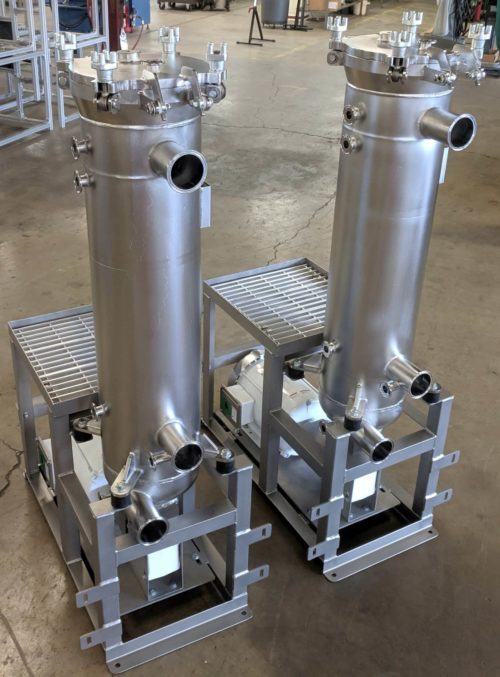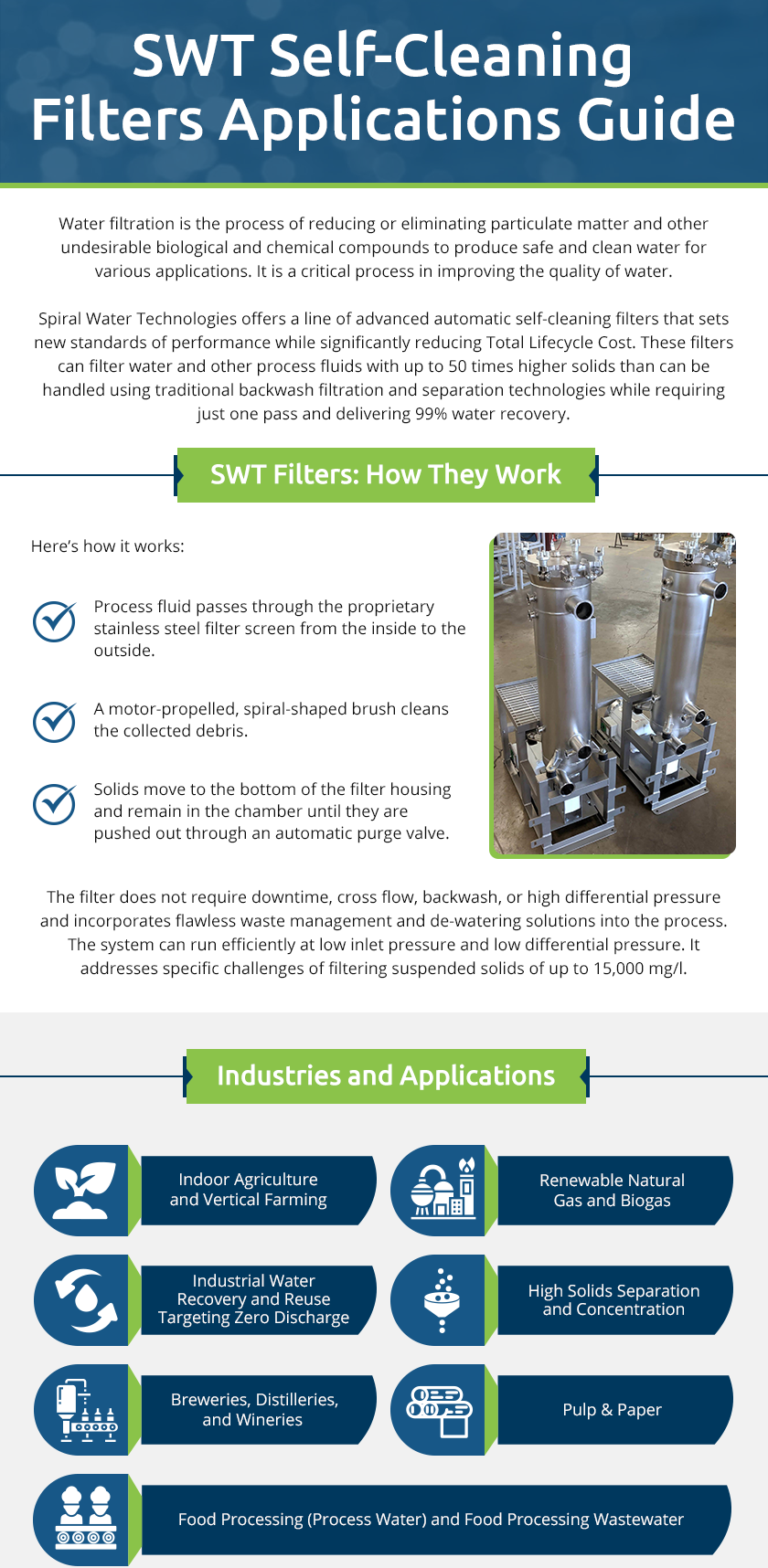Water filtration is the process of reducing or eliminating particulate matter and other undesirable biological and chemical compounds to produce safe and clean water for various applications. It is a critical process in improving the quality of water.
Unfortunately, some common effects of dirty water in a filtration system are excessive scale accumulation, clogged equipment, and reduced pump performance. When that happens, extensive maintenance becomes necessary, which inevitably means suspension of all operations since the system will have to be shut down.
Luckily, there is a solution; self-cleaning water filters. As the name suggests, these filters routinely clean themselves depending on the parameters set for the system. Read on to learn more about how self-cleaning filters work and their applications.
How Do Self-Cleaning Filters Work?
 Spiral Water offers automatic self-cleaning filters that use advanced high solids separation and concentration technology to provide a powerful, proven, and unmatched filtration solution. Our patented self-cleaning filter has a unique one-pass system that detects, concentrates, and purges solids.
Spiral Water offers automatic self-cleaning filters that use advanced high solids separation and concentration technology to provide a powerful, proven, and unmatched filtration solution. Our patented self-cleaning filter has a unique one-pass system that detects, concentrates, and purges solids.
Here’s how it works:
- Process fluid passes through the proprietary stainless steel filter screen from the inside to the outside
- A motor-propelled, spiral-shaped brush cleans the collected debris
- Solids move to the bottom of the filter housing and remain in the chamber until they are pushed out through an automatic purge valve.
The filter does not require downtime, cross flow, backwash, or high differential pressure and incorporates flawless waste management and de-watering solutions into the process. The system can also run at low inlet pressure and low differential pressure. It addresses specific challenges of filtering suspended solids of up to 15,000 mg/l.
Self-cleaning Filters: Applications
Food Processing
Food processing industries require filtration for both process water and wastewater. Factors such as the impact on efficiencies in production time, labor costs, transportation, and product loss are considered when choosing a filtration system. The filtration system also requires strict evaluation of its capacity to protect the product’s flavor. In the past, processors relied on filtration systems to remove solids from those products, regularly achieved by using cartridges, bags and centrifuges. However, advanced filtration and separation solutions may eliminate the need to use these products.
Food processing industries are increasingly setting up water reuse and recycling programs but face challenges in managing high levels of solids in wastewater. Since all areas of processing, including sanitizing, washing, blanching, peeling, sorting, and dehydrating, generate wastewater, treating this water can be a challenge. De-watering is an important process in wastewater management, and the systems must filter out impurities to meet regulatory standards.
High solids removal from process streams is a requirement in regulatory and standard process procedures. But rotary screens can fail to meet regulatory standards or remove the right volume of solids to avoid damaging downstream equipment. Fortunately, processors can bridge this gap in the process line by using automatic self-cleaning filters. Spiral Water’s automatic self-cleaning filter confines high solids in a concentration chamber, allowing a constant flow rate throughout the filtration process.
Fish Farms
Large tanks are used to cultivate shrimp, fish, and other seafood in onshore aquaculture systems. The tanks are prone to challenges such as water quantity limitations and easy contamination with food and waste. Therefore, filtration is essential to ensure the water in these tanks is clean and free from organic matter, creating a conducive environment for the fish to multiply.
Some specific applications of self-cleaning filters in aquaculture systems include:
- Intake water filtration: Organic and inorganic matter accumulates easily in aquaculture systems. Filtration is crucial to eliminate the larger organic and inorganic solids.
- Effluent water treatment: Since aquaculture facilities often discharge into natural water, filtration is necessary to remove the suspended solids and organic matter before releasing the effluent into the environment.
- Algae and solids removal: The fish farming process and the type of water determine the filtration requirement for removing suspended solids and algae. Aquaculture systems need filtration solutions suitable for different loads and challenging water qualities.
- Elimination of aquatic invasive species: Filtration and UV systems are critical to prevent ecological havoc that aquatic invasive species cause in aquaculture systems.
The wide range of filtration needs in aquaculture systems and fish hatcheries requires an effective and cost-efficient filtration solution. Self-cleaning filters from Spiral Water can improve water quality while reducing maintenance and providing minimal water loss.
Power Generation
Power generation plants require water for cooling. Since cooling sources are typically derived from natural water sources like lakes, oceans, and rivers, the water must undergo a filtration process to remove incoming contaminants and protect the equipment. Automatic self-cleaning filters remove fish, aquatic invasive species, sediments, and silts to protect the power generation equipment.
With automatic self-cleaning filtration, you’ll never need to halt operations to manually clean or replace filters in case the cooling water clogs the system. You will notice prolonged equipment service life because turbines and pump seals will be protected from small particles such as grit and sand. Automatic self-cleaning filters also eliminate the silt coating on heat transfer surfaces which reduces the performance of heat exchangers.
Brewing
Water is a key ingredient in beer brewing and has a great influence on beer flavor. We have the differences in locally available water used to brew beer to thank for the distinct regional flavor profiles. Today, water filtration gives brewers elevated control over taste and innovation. Brewers can establish consistency across batches or mimic the water of popular beer regions from different parts of the world.
The beer flavor profile depends on the mineral composition of the brewing water. For example, water hardness — the measure of the total levels of calcium and magnesium dissolved in the water — causes a strong hoppy taste in the beer, with the hops clinging to calcium ions. Chloride gives a complex and rich mouthfeel, while sodium creates a metallic taste. Chloramine and chlorine affect the brewing process by destroying the yeast.
Some minerals bring a unique flavor characteristic that a brewer may want to retain. However, in large amounts, they can negatively impact the flavor of the beer. Other minerals are fully detrimental to the brewing process and the beer. Filtration from Spiral Water, in addition to eliminating solids, silt, sediments, and sand, allows brewers to start brewing with the exact water composition needed for the desired flavor.
Water Filtration
Water filtration traces back to ancient times. People would filter water through sand and coarse gravel to improve its taste. However, today the uses of filtration go beyond household applications. Industries use this process to remove contaminants such as solids from the water or wastewater stream.
Many producers face difficulties in managing high levels of solids in wastewater. Businesses also have a misconception that a single piece of equipment can satisfy their total filtration needs. But whether an industry is seeking TSS removal, BOD reduction, clarification, or nozzle protection solutions, it can only achieve the desired outcome through a complex set of filtration steps. Fortunately, modern filters are available to help industries address their need for new and improved solutions for waste disposal, water reuse and recycling, and recovery of valuable products from non-hazardous wastewater streams.
Self-Cleaning Filters from Spiral Water Technologies
Automatic self-cleaning filters are a great option in a variety of applications that require water quality improvement while assuring continuous flow and seamless operation. Due to the unique self-cleaning system design, the filters are cost-efficient and reduce downtime since there is no need to halt operations for maintenance.
Spiral Water Technologies offers advanced automatic self-cleaning filters for multiple market applications. Our filters provide an unparalleled solution to challenges encountered when managing high levels of suspended solids in the water. Contact Spiral Water today for all your water filtration needs.

